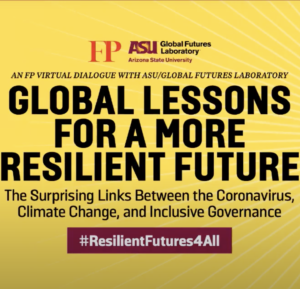On Tuesday, Arizona State University’s Global Futures Laboratory, in partnership with Foreign Policy, convened a panel of leading global thinkers to discuss the surprising but powerful links among the coronavirus, climate change and inclusive governance.
“Scientists warn, COVID-19 is not a black swan event. Rather, as astrophysicist Adam Frank has pointed out, it’s a ‘fire drill’ for climate change,” explained Amanda Ellis, director of global partnerships at ASU Global Futures Laboratory. “We need to build back better and create a new normal to keep our planet habitable. To do that, we must call out the failures of global governance and the inconsistencies of national governments.”
Speakers at the Global Lessons for a More Resilient Future virtual dialogue presented a diverse range of perspectives and insights on the urgent challenges we face, as well as key steps to address them:
- “The hope that we have to have now is that the investments that are being made on a massive scale [to combat COVID-19] will be used to drive a reemergence from that shock that is better than the starting point. From that perspective, there is a chance for us to pivot in a fairly short period of time. The key question is, will people make the right choices?” —Peter Schlosser, vice president and vice provost of Global Futures and Director of the Global Institute of Sustainability
- “Human pressures on the planet are rising to a point where we no longer can exclude crossing irreversible tipping points, like triggering collapse of forests, uncontrolled permafrost thawing, and accelerated ice melt. The COVID-19 pandemic is but a manifestation of this new reality. Building a resilient future to reduce risks of catastrophic shocks in the future requires that we take a systems approach of prosperity and equity within the safe operating space of a stable Earth. Science is today able to provide the targets for this space, to guide our ability to navigate the future.” —Johan Rockström, director of the Potsdam Institute for Climate Impact Research
- “We are dealing with straight-up misogyny, and it has to be tackled head-on. For those of us who have been in the tiny group that ever got to lead our countries, taking on a lifetime mission of encouraging others to come, stand their ground, build the networks, and be supported to climb that staircase that leads to leadership—that’s very important to me.” —Helen Clark, former Prime Minister of New Zealand and former administrator of the United Nations Development Group
- “More effective and inclusive multilateralism is required to adequately address COVID-19 and the climate crisis. More diverse voices must be heard: women, youth, indigenous people, civil society, and private sector. Parliaments can and should represent all those voices.” —Martin Chungong, Secretary General of the Inter-Parliamentary Union
- “We’ve learned about global solidarity—what I do here is going to affect the rest of the world, which is what happens with the climate crisis. We have learned about the ability of all sectors to mobilize to address a crisis. Now, private companies and governments can’t tell us that we can’t mobilize to stop climate change, because we have seen it.” —Xiye Bastida, Indigenous youth climate activist and co-leader of Fridays for Future
- “Women who are more empowered [at work and at home], have more of a say over how their resources are spent. When this happens, we have found that a much greater amount of resources is allocated to education, to health, which of course then helps to build up human capital over the longer term.” —Augusto Lopez Claros, international economist and chair of the Global Governance Forum
- “There’s data out there that make it very clear that in terms of natural disasters, countries that have higher “peace” scores are also actually experiencing exponentially fewer deaths as a result of natural disasters. So, there’s a built-in resilience there in what is actually much more enjoyable day-to-day life.” —Maxine Burkett, co-founder and senior advisor of the Institute for Climate and Peace
- “The COVID crisis has shown us that we can operate differently. The things that seemed inevitable are really not. In fact, if we push ourselves, we can do extraordinary things together. Individual and community action can spur both sustainable and systemic change.” —Maya Soetoro, co-founder and senior advisor of the Institute for Climate and Peace
Missed the event? Watch the recording and add your voice to the conversation on social media with #ResilientFutures4All.
